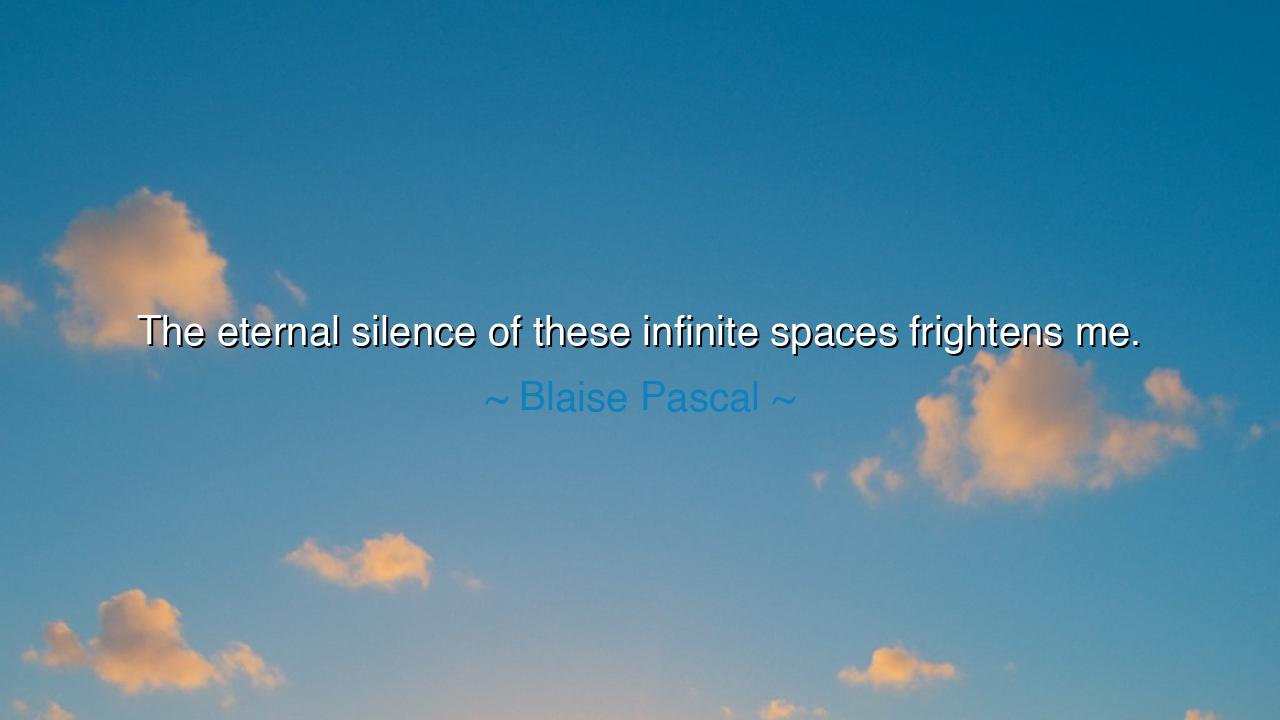
The eternal silence of these infinite spaces frightens me.






In the infinite vastness of the cosmos, where the stars twinkle like eternal beacons, there lies a truth that resonates deeply within the heart of every seeker, every philosopher, and every human being who dares to contemplate the mysteries of the universe. The great Blaise Pascal, a man of deep thought and spiritual insight, once said, "The eternal silence of these infinite spaces frightens me." These words, spoken with the weight of both reason and emotion, capture the profound dread and wonder that comes with contemplating the boundless, silent expanse of the universe. For in the vast emptiness of space, where time itself seems to lose its meaning, Pascal saw a reflection of the insignificance of humanity—a reminder of the deep mystery and unknown that we must all face.
In the ancient world, the cosmos was not a silent, cold void, but a realm filled with divine voices, the gods who watched over the world and shaped the destinies of men. The Greeks, particularly through the stories of Homer, believed that the stars were the eyes of the gods, that the heavens were alive with purpose and meaning. In contrast to the silence that Pascal describes, the heavens were once filled with divine action—thunder and lightning from Zeus, the movements of the planets governed by the will of the gods. But over time, as humanity’s understanding of the heavens deepened, the mystical quality of the stars began to fade. The silence of the universe, once thought to be the realm of gods, became a reminder of the emptiness that lies beyond our comprehension.
Pascal’s statement comes not just from an intellectual understanding of the cosmos, but from the existential fear that such vastness inspires. The ancients knew that to confront the unknown was to confront the deepest fears of the human condition. Think of the explorers—from the Phoenicians sailing into the uncharted seas to the Romans venturing beyond their empire’s borders. They were driven not only by the promise of new lands and new knowledge, but by the terror of what lay beyond the horizon. In the face of the infinite, each journey was a confrontation with the vastness of the unknown, and thus, with their own fears of insignificance. Pascal's fear, then, is not unique, but one that is shared by all who dare to face the great mystery of the universe.
The fear of silence—especially eternal silence—is rooted in humanity’s deepest longing for meaning. We, who are bounded by time and space, seek connection, sound, and purpose in every moment. The idea of an endless, silent void, as Pascal describes, challenges our very understanding of existence. The ancient philosophers like Socrates and Plato wrestled with the idea that the universe was governed by eternal, unchanging principles. To some, this order brought peace; to others, it evoked a deeper questioning—was there a purpose to the vastness? Could we, as mortal beings, ever understand the divine harmony that governed the stars and the silence between them?
Consider the story of the astronomer, Galileo, who peered through his telescope and discovered that the Earth was not the center of the universe. This discovery was not just scientific; it was philosophical, for it placed humanity not at the center of existence, but as a small and fragile part of a vast, indifferent universe. Galileo’s discovery did not bring fear of silence, but it did bring the realization of humanity’s fragility in the face of infinity. Pascal’s words echo this realization—that to contemplate the eternal silence of the universe is to confront the insignificance of human life in comparison to the vast, unknowable spaces of the cosmos.
But let us not lose heart in Pascal’s fear, for his words also contain a lesson—the silence of the universe is not to be feared, but to be embraced. In that silence, in that infinite space, lies both freedom and meaning. We are not bound by the noise of daily life or the trivialities of earthly concerns, but instead, we are free to reach out and seek understanding in the face of the infinite. The great philosophers of history have sought to answer the questions that Pascal poses—the questions of life’s purpose, of the nature of the universe, and of humanity’s place within it. By contemplating the silence of the stars, we may not find answers, but we find the humility to seek them.
The lesson of Pascal’s words is a call to action, a reminder that while the cosmos may seem indifferent and silent, we, too, are part of this great mystery. Our fear of the unknown should not paralyze us, but inspire us to seek deeper truths, to connect with the universe in ways that transcend the limitations of the human mind. Whether through science, philosophy, or spirituality, we must confront the silence with courage and wonder, knowing that it is in the vastness of the universe that we find not only our smallness, but also our potential. The eternal silence of the cosmos is not something to fear, but something to explore— for in that silence, we may find our greatest discoveries.
So, let us take Pascal’s words to heart, not as a source of fear, but as a reminder of the great mystery that surrounds us. Let us live our lives with reverence for the vastness of the cosmos and humility before its silent beauty. The eternal silence of space is not the end of our journey—it is merely the beginning of our search for meaning, a search that will continue long after we have heard the last whisper of the stars.






AAdministratorAdministrator
Welcome, honored guests. Please leave a comment, we will respond soon